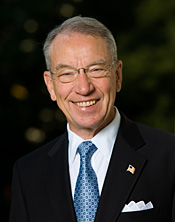
The Declaration of Independence recognizes each individual is endowed with inalienable rights. Americans cherish our blessings of freedom, including the rights of individuals to worship freely. From one generation to the next, Americans enjoy the freedom to live one’s faith, no matter one’s creed, and to share in those traditions with family and loved ones.
Religious liberty is a protected constitutional right enshrined in the First Amendment. It serves as a shining beacon of freedom from sea to shining sea. America can leverage our leadership to spark religious freedom in regions of the world blanketed by discrimination and oppression.
America’s founders adopted our founding charter of freedom in the 18th century. And yet today in the 21st century, religious discrimination endangers innocent lives in cultures and societies around the world.
People are persecuted for their faith by authoritarian dictatorships and terrorist groups. Countries like China, North Korea and Pakistan restrict their citizens’ rights to practice their chosen religion and worship without fear. To combat reigns of terror on people of faith, Congress passed the International Religious Freedom Act in 1998.
President Trump keeps delivering on his promise to stand strong for religious freedom. In fact, the Trump administration has made it a top foreign policy priority.
In December, the State Department issued a report that re-designated nine countries as “countries of particular concern” for carrying out or tolerating systematic, ongoing and egregious violations of religious freedom. It placed eight countries on a special watch list for governments that have engaged in or tolerated severe violations of religious freedom.
Countries designated “of particular concern” can be subject to further actions by the United States, including increased diplomatic pressure and protest; reduced diplomatic, scientific or other engagement; reduced development assistance; or, sanctions.
These efforts are needed more than ever. Persecution around the world continues to put people of faith in harm’s way. In some areas, the climate of oppression is only getting worse. For example, the People’s Republic of China plans to enforce additional restrictions on religious groups starting this month.
While the United States doesn’t have the singular authority to stop the religious persecution occurring in China, we can apply pressure on Chinese leaders by linking the need for religious freedom to aspects of our bilateral relationship that matter to China. We are in a powerful position to influence Chinese leaders to honor fundamental human rights. Fighting for religious freedom should be a central part of the United States’ relationship with China.
In October 2018, I sent a letter to Secretary of State Mike Pompeo expressing my concerns about the ongoing religious persecution of religious minorities by the communist regime in China. I am encouraged the State Department placed visa restrictions last fall on Chinese government and Communist Party officials who are believed to be responsible for, or complicit in, the detention or abuse of Uighurs, Kazakhs or other members of Muslim minority groups in Xinjiang, China.
The Department of Commerce also added 28 Chinese entities connected to Xinjiang abuses to its Entity List, which names foreign persons, governments or companies engaged in activities contrary to U.S. national security and/or foreign policy interests and requires special licensing to conduct business with U.S. companies.
What’s more, I would like to see the United States help citizens from countries like Russia, Bangladesh and Sudan who live under authoritarian regimes and face persecution for faith and religious beliefs. Whereas Americans have enjoyed the freedom to worship for more than 200 years, a number of countries punish individuals who engage in expression deemed by their government to be blasphemous, heretical, apostate or defamatory of religion.
As Iowa’s senior U.S. senator, I stand shoulder to shoulder with people of faith and support a Senate resolution that calls for the global repeal of blasphemy, heresy and apostasy laws.
Blasphemy laws are a vehicle for egregious violations of religious freedom and related human rights. As the U.S. Commission on International Religious Freedom (USCIRF) notes, these laws inappropriately position governments as arbiters of truth or religious rightness. They exacerbate religious intolerance and discrimination, and embolden extremists to commit violent acts against perceived blasphemers.
These laws affect Christians, Muslims, Hindus, Bahá’í, secularists and many other groups. USCIRF research has found blasphemy charges are often used for sectarian or political purposes, and foster religious intolerance, discrimination and violence. As a human race, we ought to support the sacred right of individuals to worship in peace without fear of persecution. Whether one worships in a synagogue, mosque, church or elsewhere, Americans can’t take religious liberty for granted.
Indeed, America must keep our beacon of liberty shining brightly for all the world to see. As a country founded on individual, God-given rights, we must advance human rights and religious freedoms for our brothers and sisters around the world. We must work to identify and combat discrimination, not look the other way and allow abuses to hide in the shadows.








